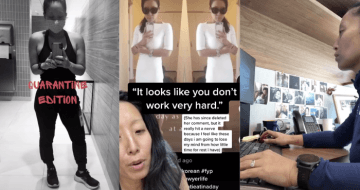Law graduate Anca Andreea Aurica explores the popularity of South Korean pop music and the growing curiosity around artists’ contracts

Record labels hold substantial power and control in the music industry, shaping artists’ careers and providing the crucial platform for their artistic talent to flourish. However, a concerning issue arises when some influential entities go beyond facilitating artistic expression and start manipulating not only the artist’s professional journey, but also shaping their core identity.
We will explore the K-pop phenomenon, a global sensation that exemplifies the intricate dynamics between record labels and artists in the contemporary music landscape. We will be diving deep into some of the contractual ties that bind K-pop artists to their agencies, and the potential human rights implications that could echo from these agreements. We will also be exploring the freedom of contract, or perhaps the lack thereof, and the steps that can be taken to avoid any restrictive contracts. And finally, we will be striking a hopeful note with a recommendation for labels to harmonise with artists, rather than ensnaring them in a symphony of never-ending, unjust contracts.
Context
Let us delve into the K-pop phenomenon. This is not just a catchy tune on your playlist; it is a global symphony, amplified by the power of digital media and the latest tech innovations. K-pop has danced its way across cultural borders, creating a universal stage for young people to connect and engage. South Korean pop music, or K-pop as it is better known, is a shining example of content that has hit the right note with audiences worldwide, thanks to the strategic planning, business execution and marketing of the entertainment agencies nurturing the artists.
But behind this catchy beat, there is a more somber tune playing. The contracts binding some K-pop artists to their agencies may come with strings attached, strings that can control not just the artist’s career, but their identity too.
Imagine signing a contract that not only dictates your career but also your personal life. Picture working up to 20 hours a day, with no time to rest, and being cut off from your family and normal life. The contracts signed by some K-pop artists have been found to contain provisions that entail limitations on various aspects of their private life, such as dating, dietary restrictions, plastic surgery and limited vacation time.
This sounds like less of a contract and more of a violation of human rights. The inclusion of a ‘no dating’ clause can be perceived as excessively intrusive as it may infringe upon individuals’ fundamental rights to privacy and family life, as stipulated in Article 17 of the International Convention of Civil and Political Rights. South Korea’s ratification of this convention raises concerns regarding the reported suppression of artists by entertainment companies. These companies often justify the imposition of no dating bans as a precautionary measure against potential scandals that may negatively impact an artist’s public image. Despite the temporary nature of such bans, usually lasting around three years, the adverse consequences are already imposed upon the artists.
This is the consequence of a notable disparity in bargaining power, resulting in a constrained freedom of contract. K-pop artists typically find themselves in a comparatively weaker position, so their ability to negotiate contractual terms becomes significantly limited. Often presented with non-negotiable agreements, these artists face a binary choice, compelled to sign to advance their aspirations of achieving fame.
It is a harsh reality that can lead to severe mental health problems. As a result of these contracts, many artists have initiated lawsuits against their record labels.
Want to write for the Legal Cheek Journal?
Find out moreCase studies
In 2009, Han Geng took his agency SM Entertainment to court. The dispute? A 13-year contract that allegedly contained unfair profit distribution and rigid lifestyle restrictions. No sick leave provision was included in the contract, which made it impossible for the artist to cancel events on the basis of infirmity. The court’s verdict? Music to Han Geng’s ears, as he was free from the contract’s restrictive ties. On September 27 2011, Han Geng’s departure from his boy band, Super Junior, was officially announced through a joint statement by his and SM Entertainment’s legal representatives. The statement confirmed that “Han Geng and SM Entertainment have amicably settled on a mutual agreement, and the lawsuit was able to come to a close”.
The same year, three members of the boy band TVXQ, now JYJ, sued the same label. The case gained significant media attention. The dispute? Again, a 13-year-long contract which the band claimed contained unfair profit distribution and intensive schedules. The contract had a “damages clause” that imposed heavy penalties on the artists for cancelling the agreement. On the other hand, the contract allowed the label to terminate at any time without compensating the artists. The court ruling addressed the issue of contract duration, stating that a 13-year term was excessively long. The Korean Fair Trade Commission (KFTC) also investigated and concluded that after seven years, the artists should have the option to terminate the contract. The court in fact noted the absence of termination options for the artists and found the resulting damages imposed for the cancellation to be unfair. The court deemed the whole contract unconscionable due to the excessive control it granted to the label. This led to reforms being implemented later by the KFTC to address, among other issues, entertainment companies’ unfair contract cancellations and excessive penalties.
Since Han Geng and JYJ’s lawsuit against the company, SM Entertainment has been urged to improve contract terms. In 2010, SM Entertainment made a public declaration to implement progressive reforms aimed at enhancing celebrity rights and raising the overall standards of the entertainment industry. SM representatives, together with government auditor Jo Moonhwan, pledged to foster ongoing discussions with the aim of improving contractual terms. Kim Young-min, former CEO of SM Entertainment, emphasised that the company’s commitment to improving standards would create a mutually beneficial scenario for celebrities and their management. “We’ll do our best to improve the culture industry, which causes Hallyu’s expansion, and add national value to it,” he stated.
While some artists are winning their battles and their songs are heard, many stories remain unheard. These are the stories of artists who remain bound by restrictive contracts, silenced by the imbalance of power.
Steps taken and recommendations
But it is not all doom and gloom. There is a growing chorus of voices calling for change. They are pushing for contracts that protect artists equally, ensuring that they are not just performers but partners in their own careers. The law is stepping in, hitting the right notes to prevent unfair contracts and ensure a fair distribution of profits and creative control.
The KFTC has taken the stage, investigating talent contracts and setting a seven-year limit on their length. They have also introduced a ‘standardised contract’ to keep things in tune. Further action was taken in 2017, when the KFTC identified and prohibited six types of unfair contractual terms and conditions. But despite these measures, the music has not stopped for many artists. Many contracts continue to play to the tune of the entertainment agencies, with some companies still hitting the wrong notes when it comes to fairness.
As we sing along to the catchy tunes, let us not forget the importance of legal harmony. Let us rewrite the industry’s symphony, ensuring that artists have the power to shine and chart their own paths. It is time to compose contracts that hit all the high notes, protecting artists’ rights, and granting them the freedom to create their own melodies. A true symphony of fairness. Because in this melody-filled world, it is not just about the music we hear; it is also about the contractual cadence that allows artists to flourish.
Anca Andreea Aurica is a University of Westminster law graduate, currently pursuing the LPC with an integrated master’s at BPP University.
 (
( (
(

